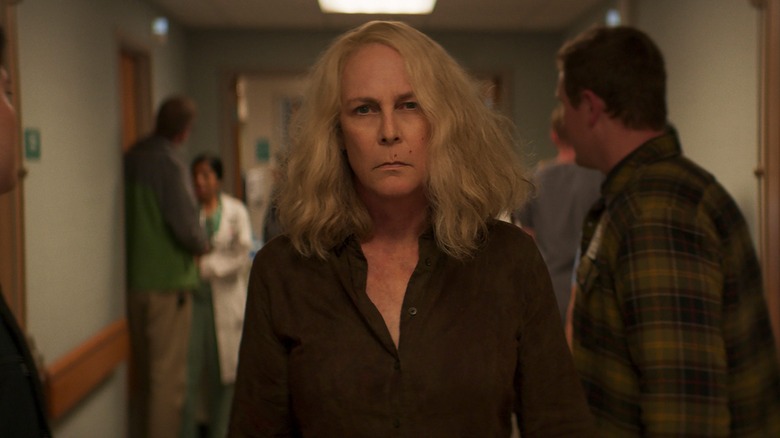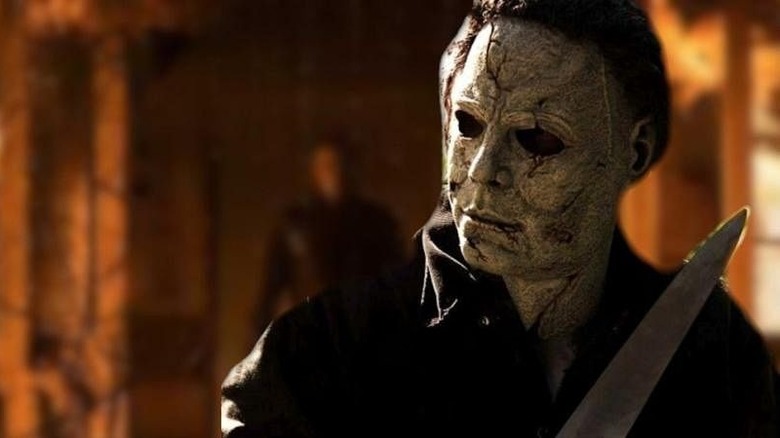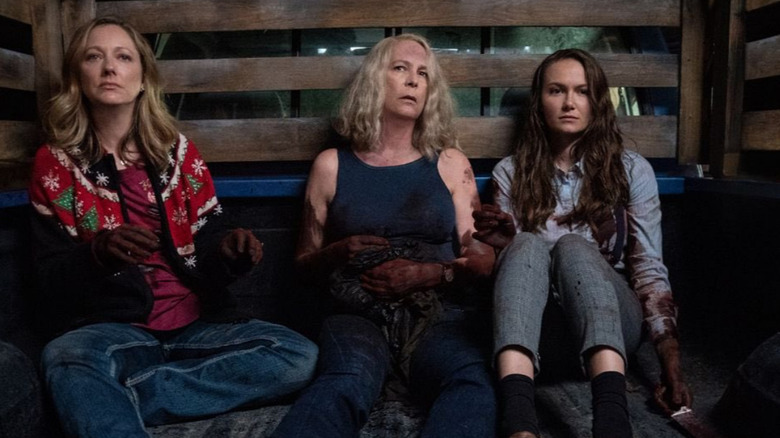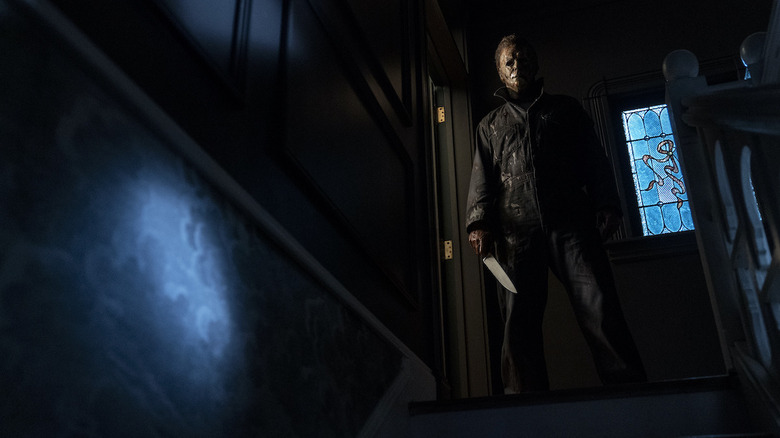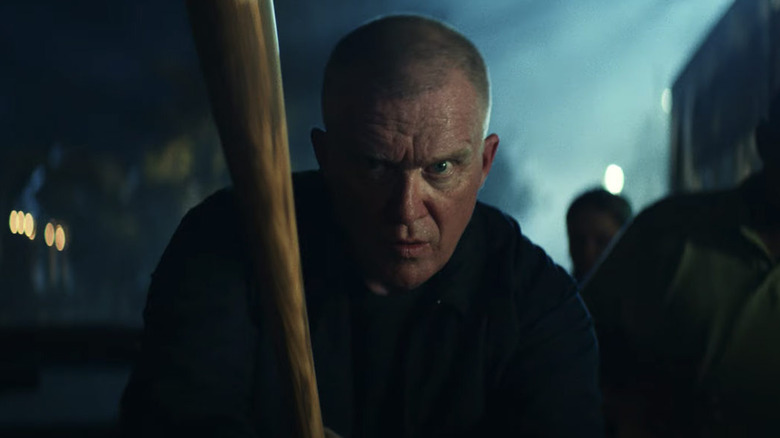Halloween Kills Producer Jason Blum On Why Sequels Are Difficult [Interview]
In 2018, Blumhouse surpassed expectations with "Halloween," David Gordon Green's sequel to John Carpenter's 1978 slasher classic. Surpassing expectations wasn't anything new to Blumhouse, but the production company delivered a hit reboot that most audiences weren't expecting. Not just a hit, but more importantly, a well-liked return to the world of Laurie Strode and Michael Myers. Three years later, the horror icons return in "Halloween Kills."
"Halloween" is one of the bigger Blumhouse titles. A $15-20 million budget for a hit sequel, of course, is big by Blumhouse's standard. Nonetheless, there still wasn't enough time or resources while making "Halloween Kills" as producer Jason Blum told us ahead of the release of the highly anticipated sequel. Recently, the producer talked to us about making David Gordon Green's sequel, the trick of delivering a good sequel, and more about the inner-workings at Blumhouse.
I've never seen someone get killed in their armpit.
For some people, David Gordon Green was a surprising choice for "Halloween," but given his independent spirit, does he just gel well with Blumhouse?
Yes, we are kindred spirits. He's been a great business partner. We're doing the three "Exorcist" movies with him, so that'll make six movies. There's a seventh movie we're talking about doing. I love working with him, and I know he loves working with us. It's been a great partnership with him, for exactly the reason that you say. We do best with directors who are very entrepreneurial, and he is that. He thinks outside the box, and that's our kind of person.
The budget was bigger this time around, though, right?
Yeah, but by Hollywood standards, the budgets are still tiny. If Hollywood has a movie that does $260 [million] worldwide, the sequel of that movie is going to cost $70 million dollars. Ours was $15 or 20 [million], whatever it was. So, it's still very tight. And if you talk to David, he'd say was very, very tight. People who love movies, whatever the budget is you're always trying to be good at your job. You're always trying to fit twice as much story into whatever the budget allows for. David is definitely no exception to that rule. I think it was very tight. There was not enough money and not enough time.
I enjoyed watching you and John Carpenter disagree on that, with him saying, "More money and time, the best."
Oh yeah, we did. We have a very different point of view, John and I, on that one, that's for sure.
What's an instance of David Gordon Green really stretching the resources he has on "Halloween Kills"?
Well, all the kills are very complicated because you get to do them once. It takes an hour and a half, two hours to set it up. A lot of those are done practically, and if you screw it up, you probably aren't going back. The pressure builds on the set, and David is good at not tearing his hair out. Someone else might.
Do you have a personal favorite in the movie?
Well, my favorite kill is the armpit kill. I've never seen someone get killed in their armpit. That was a highlight for me.
It is risky to do, but if you can pull it off, it's great.
Obviously, you have a lot of experience making sequels, what's usually the trickiest part of making them?
It's always the same, which is to make it relate to the first movie enough that people don't feel like it's... It merits the two in the name, right? But also, to make it original enough that it doesn't feel like you're retreading or repeating the first movie. I think people often make mistakes with sequels when they think, "Well, the first movie works. Let's just do more of what we did on the first movie." And that's always when fans are let down. You've got to, kind of, do both. I think David has kind of walked that line so well, with both movies. I should say, in fact, with all three movies. Because the first movie had to do that too. The first movie is also, technically, a sequel. So he had to kind of walk that line three times. I just think he did it elegantly.
Would you say the next one will have a slightly different tone then, too?
Yeah, I think that's true. I think the second movie is tonally a little bit different than the first and I think the third is tonally a little bit different than the second. It is risky to do, but if you can pull it off, it's great.
You and David, at one point, considered shooting two of these back to back. But then you realized that's crazy. When did you both realize it was a crazy idea?
We did. We were going to shoot two to three, back to back. You have to ask David to confirm this, but I think the real issue was, we didn't want to do that unless we were madly in love with both scripts. David felt like he wanted to work more on the third script and wasn't ready to do that. So we broke it back up into one at a time, which I'm happy about. You don't want to do that unless you're feeling both scripts are perfect. I think the third movie will be better because we waited.
You usually don't visit sets unless something is going wrong.
That's true.
"Halloween Kills," though, being the big franchise that it is, do you visit the set more?
In fact, the opposite. With David, he's so capable. I try and be where I'm having the most impact on the company, on the movies, on the shows. If I'm super active on set, I haven't done my job very well. Meaning, the people who work for me are not doing something right. Or the director I've chosen is not doing a terrific job. Hopefully, I've made all the right choices, so I don't have to spend so much time on set. And that's not true on every movie, but on "Halloween" it was. And so, I don't.
People went bananas for the movie.
How much does Blumhouse usually test screen?
We test screen a lot. Much to the horror of some directors... Not all directors, a lot of directors like to do it. I love to test screen movies. Not so concerned about the scores, but I'm very concerned about watching a movie play with an audience and making tweaks after you do that. "Paranormal Activity," we test screened that movie 50 times.
It wasn't always recruited with 300 people in the audience, but we would screen it and tweak, and screen it and tweak. Even if it was five people, or 10 people, or 20 people. You can't listen to everything the audience says, because they don't all agree. I think the more you show a movie to an audience in a rough cut, and the more you tweak it, the better it gets.
How's David Gordon Green with test screenings?
David definitely embraces it. Let's think, who else here?
How about Scott Derrickson?
You made me think of Scott. Scott Derrickson was kind of in the middle. He doesn't hate it, but he doesn't love it. Leigh Whannell, he thinks it's important, but he hates doing it. So that's true of a lot of the directors, too. They hate doing it, but they know that it's important.
What's the best and worst experience you've had testing a movie?
Well, "Paranormal Activity" was the best. That was by far the best because people went crazy. When we first screened the movie in a real movie theater, in a mall, people went bananas for the movie. That was the best, most memorable test screening I ever had. The worst one, I think, was probably the first "Purge" movie.
The first version of the movie scored very low, and I didn't know what we were going to do to fix it. It was one of the first movies I had made with my new deal with Universal, so we had pressure to deliver a good movie. I was very frustrated with how low that movie scored, but we all turned it around, and we're six movies in now. That story has a happy ending.
It hasn't changed from when we were going to release it last year.
Did "Halloween Kills" change at all during the last year or was picture locked for a while?
No, I think we got to spend a little more time with it, but the movie that you saw existed 12 months ago. It hasn't changed from when we were going to release it last year.
Any scenes hit the cutting room floor?
I doubt there was much. I mean, one of the great things about working with someone like David, who's got so much experience, is he's loath to waste money. Wasting money means shooting things that don't wind up in the movie. I would say his ratio of what you shoot to winding up in the movie is very high.
Do Blumhouse's movies usually not end up with many deleted scenes?
I would say compared to other studios, there's way less. Like animation, we try and do the cutting before we start shooting. I try and never shoot a script that's over a hundred pages for that reason.
Any movies that radically changed in the editing room?
They all change a lot, but yeah, "Ouija" radically changed. We shot an additional 10 days on that movie and it was completely different. Mike Flanagan came in and redid 10 days of photography on "Ouija 1," which completely changed in post-production. Mike did such a good job that we hired him to direct the second movie.
Do you ever talk to John Carpenter about maybe making a movie for Blumhouse?
You know, we've danced around the conversation. I think he's very happy doing music. Obviously, he does music for all the movies and having a great time doing that. I don't push it.
"Halloween Kills" is now playing in theaters.
